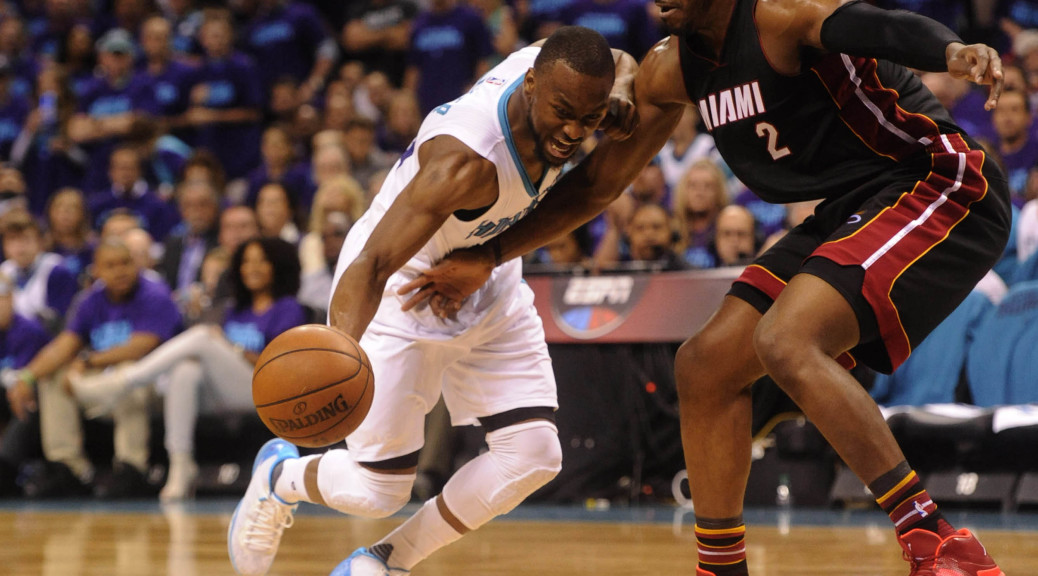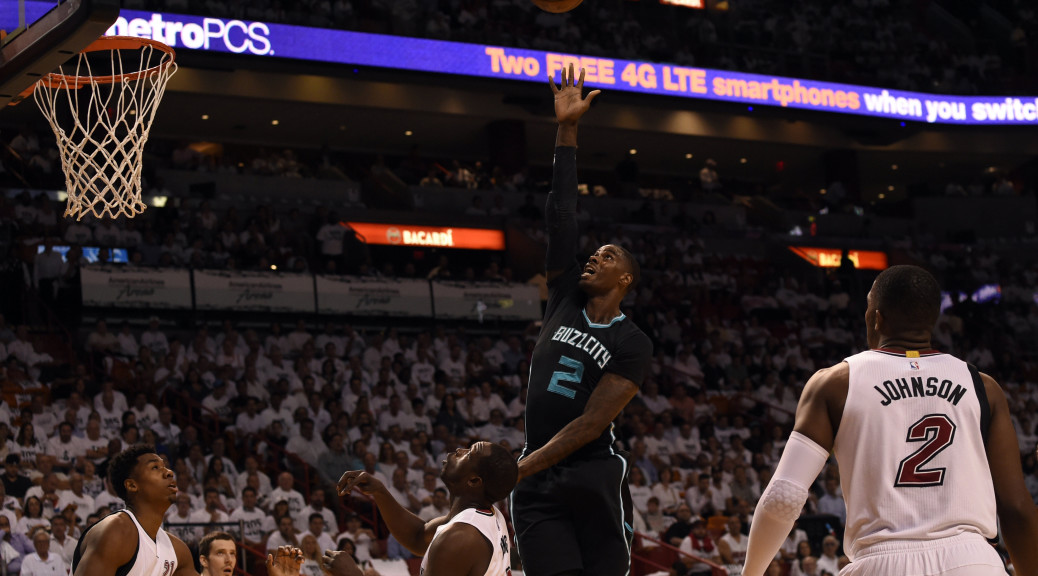May 9, 2002. This is the date of the last time the Charlotte Hornets won a playoff game. The Hornets defeated the New Jersey Nets 115-97; Baron Davis, with 26 points, was the leading scorer. The late Robert “Tractor” Traylor played in the game. Richard Jefferson is the only participant from that Thursday evening contest still active in the NBA. LeBron James, who was a junior in high school in the spring of 2002, entered the league, and racked up over 46,000 minutes of game action, including the playoffs, between playoff victories for the Hornets.
What I’m trying to say: 14 years is a long time, and a lot has changed in the NBA. The franchise left the state, departing south for the Crescent City. Then the Bobcats became a thing a few years later. About a decade after that, the team rebranded once again as the Hornets. In the second year of that effort, Charlotte broke through Saturday afternoon with with a dominating 96-80 victory over a Miami Heat squad that had been playing better than just about anyone through two games of postseason progress.
The Hornets have been terrific on their home floor all season long; during the regular season, they won 30 games at Time Warner Cable Arena (the third best home court record in the Eastern Conference), and in the third game of their first round series, Charlotte defended their court, and they did so sans one of their best players.
Star forward Nicolas Batum couldn’t fit his swollen left foot in a sneaker (thanks to an ankle injury suffered in the Game 2 defeated) let alone play a game of basketball on Saturday. In the regular season, Charlotte scored five more points per 100 possessions with Batum on the court — the difference between a top-five offense and a bottom-five offense. Normally when Batum misses games, coach Steve Clifford will go smaller with his starting lineup, and insert Jeremy Lin in as another guard while sliding Courtney Lee down to small forward. Saturday, however, he did just the opposite of that. Instead, Clifford replaced Batum in the first five with rookie big man Frank Kaminsky. Marvin Williams, the team’s power forward, moved to the three-spot, and veteran Al Jefferson replaced Cody Zeller as the starting center.
This was a bold move from Clifford, who continues to prove himself as one of the best half-dozen or so coaches the NBA has to offer. I’m usually not a fan of upsizing a lineup to create mismatches. Look where the league’s heading — everything’s smaller and faster, which makes sense. It’s wise to get as much passing, shooting and speed on the court as you possibly can. However, Clifford laughed in the face of that wisdom, and went with a big lineup. Miami wings, who had bullied Charlotte’s perimeter players during the first two games in South Beach, found match-ups for posting up far less palatable against a longer and stronger Hornets lineup: Joe Johnson shot only 3 for 11 from the field, and only one of those buckets came at the rim.
Jefferson’s start was also likely an attempt to draw early fouls on Miami’s stud center Hassan Whiteside. In Games 1 and 2, Whiteside averaged 19 points, 12 rebounds and missed only two shots.
The primary concern, though, would be if Kaminsky, who struggled early in this series, could hang with Miami’s Luol Deng. Miami shot 74.4 percent in the first half on their Game 2 victory, but no one gave Charlotte bigger fits than Deng, who recorded 47 points on 24 shots in Games 1 and 2. It looked as though he was picking up right where he left off at the start of Game 3. The former Duke Blue Devils sank four 3-pointers in the first quarter, usually with Kaminsky a step slow closing out.
But after some initial shakiness, Kaminsky settled in on Deng. The Miami forward hit a three with a little under 10 minutes left in the third quarter, which gave him 15 points and made the score 51-47, in favor of Charlotte. After that bucket, Deng was held in check: he made only one more shot from the field and finished with 19 points. Kaminsky used his height and length to aid in some closeouts; he contested a game-high six 3-pointers, per NBA.com’s player tracking.
Charlotte also communicated better, and functioned cohesively as the top-ten defense that they are. The Hornets held the Heat to only 84 points per 100 possessions, and when Kaminsky was on the floor, the Hornets allowed only .89 points per possession.
On the other end, Kaminsky punished Miami. During his first two playoff contests, Big Frank played roughly 37 minutes and scored a measly four points — all from the free-throw line. But in front of a raucous home crowd, Kaminsky was a different player. He missed on all three of his attempts from beyond the arc, but Kaminsky, who was second on the team with 61 touches, took advantage of the smaller defenders thrown at him. He was an impressive 5 of 9 shooting close to the basket; check his shot chart per NBA.com:

Lin was one of the best sixth men in the league this season, and on Saturday, he brought his usual aggressive approach off the bench. In a little over 26 minutes of action, Lin scored 18 points, drilled two 3-pointers, dished out four assists and didn’t turn it over once (more on this in a minute).
16 of Lin’s minutes came while sharing the floor with Kemba Walker. The dual-point guard lineup was a favorite of Clifford’s all season, but Miami’s Dwyane Wade and Goran Dragic punctured that smaller look in South Beach. Back in Charlotte, however, Lin and Walker were up to their old tricks, and the Hornets absolutely cooked with those two holding court together: outscoring the Heat by 35.4 points per 100 possessions. Wade went 7 for 20 from the field, and I’m not sure if he got back once on defense the entire second half. The All-Star guard was clearly frustrated and spent most of the fourth quarter complaining and gesturing at the referees while the Hornets raced the in the other direction with the ball.
Clifford really tightened up the rotation yesterday. Only seven players played more than 12 minutes, including Cody Zeller. The 7-footer recorded 60 starts this season, but if he was upset about coming off the bench on Saturday, he certainly didn’t show it. The third-year center recorded 12 points and eight rebounds. Charlotte was +18 with Cody on the floor. All season long, the Hornets have exhibited fantastic chemistry. Saturday in Charlotte, it was on full display.
This was not the kind of shooting performance we’ve grown accustomed to with the 2016 Hornets. They shot 39 percent from the field and made only five 3-pointers. Those totals don’t usually result in victory, but they defended and were so darn good on the margins offensively. Charlotte was an absurd 21 of 22 from the free-throw stripe and turned the ball over only three times. Miami, conversely, missed 11 free-throws and turned it over 14 times. This was the difference.
Charlotte’s three turnovers tied an NBA record for the fewest turnovers in a playoff victory.
This was a really entertaining game to watch, too. The home crowd was there for the Hornets every time they needed encouragement to match a Heat run. Kemba — who has assumed a more vocal leadership role with this crew, especially following the shoulder injury to Michael Kidd-Gilchrist, the team’s heart and soul — didn’t shoot well (4 of 19), but he was in constant motion. Recording two steals, seven assists and constantly imploring the home crowd to come alive. He even exchanged words on multiple occasions with Whiteside (I would pay good money to hear audio from one of their discussions leading into a timeout — it seemed spirited!).
Marvin Williams, Mr. Steady Eddie all season for Charlotte, finally announced himself in this series on Saturday, too. After shooting 1 for 17 in the first two games, Williams slapped up a double-double in Game 3: 12 points and 14 big rebounds. You could feel a sigh of relief in the building after he splashed his first 3-pointer of the series in the second quarter. This series takes on a totally different shape if Williams regains his form from the regular season.
It’s great to get the proverbial monkey off the back and win a postseason game, but Charlotte still trails Miami 2-1 in the series. Batum’s status for Game 4 is currently up in the air; he was visibly antsy while in street clothes Saturday, jumping at the bit to hoop in front of Charlotte’s booming crowd. The turnaround is quick, though. Game 4 takes place Monday evening in the Queen City. Can Batum come back so quickly? If not, can Clifford once again bank on Frank to hold his own against Miami’s go-go fours?
And on the flip, how will Miami coach Erik Spoelstra — one of the best in the league at adjustments — counter Charlotte’s Game 3 performance and lineups?
There’s a lot of basketball left to play, and it will be interesting to see how Miami responds Monday night. Let’s just make sure we don’t have to go another 14 years between playoff victories.










